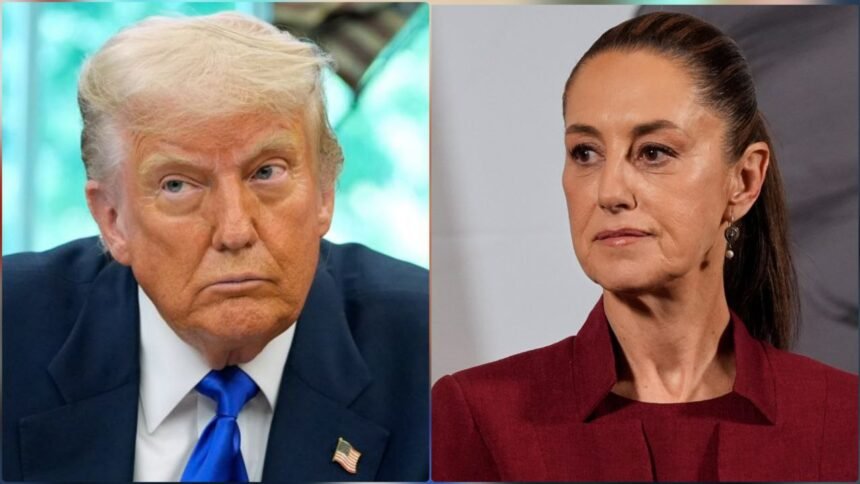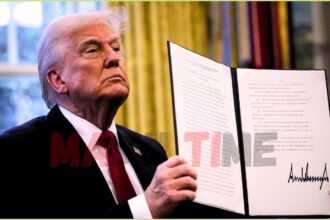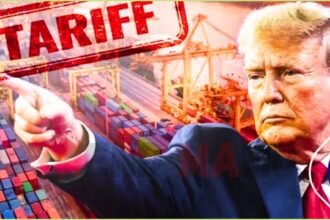Trump 30% Tariff Plan Draws Fire from EU and Mexico. U.S. President Donald Trump’s announcement of a proposed 30% tariff on imports from the European Union (EU) and Mexico, set to begin August 1, 2025, has sparked sharp criticism from both trading partners.
The move, part of Trump’s aggressive trade policy, aims to address trade deficits and border security concerns but risks escalating tensions with two of the U.S.’s largest trading partners. The EU and Mexico have condemned the tariffs as unfair, signaling their readiness to negotiate while warning of potential countermeasures if talks fail.
EU Slams Tariffs as Trade Talks Falter
In a letter posted on Truth Social to European Commission President Ursula von der Leyen, Trump justified the tariffs by citing the U.S. ‘s $235.6 billion trade deficit with the EU in 2024, which he called a “major threat” to national security.
He accused the EU of maintaining unfair tariff and non-tariff barriers, stating, “Our relationship has been, unfortunately, far from reciprocal.” The EU, a key U.S. trading partner with nearly $1 trillion in two-way goods trade last year, expressed disappointment.
Von der Leyen emphasized the EU’s commitment to “fair trading practices” and readiness to negotiate a deal by August 1, but warned of “proportionate countermeasures” if necessary. European leaders, including France’s Emmanuel Macron and Dutch Prime Minister Dick School, criticized the tariffs as “unjustified” and urged unity to protect EU interests.
Bernd Lange, head of the European Parliament’s trade committee, called the move a “slap in the face” for ongoing negotiations, pushing for immediate countermeasures.
Mexico Rejects “Unfair Deal”
Trump’s letter to Mexican President Claudia Sheinbaum linked the tariffs to Mexico’s alleged failure to curb drug cartels and fentanyl flows, claiming the country has not done enough to prevent North America from becoming a “Narco-Trafficking Playground.”
Mexico’s economy and foreign ministries issued a joint statement denouncing the tariffs as an “unfair deal” and stressed that the nation’s sovereignty is “non-negotiable.” Sheinbaum, maintaining a diplomatic tone, expressed confidence in reaching “better terms” through negotiations, stating, “We are clear on what we can work with the USA and what we cannot.”
Unlike Canada, which received a 35% tariff threat with exemptions for USMCA-compliant goods, Trump’s letter did not clarify whether Mexico’s USMCA goods would be exempt, adding uncertainty to trade relations.
Escalating Global Trade Tensions
Trump’s tariff blitz extends beyond the EU and Mexico, with new levies announced on Japan, South Korea, Canada, and Brazil, and a 50% tariff on copper imports. This follows earlier threats, including a 20% tariff on EU goods in April and a 50% tariff threat when talks stalled.
The administration’s goal, articulated by trade adviser Peter Navarro as securing “90 deals in 90 days,” has so far yielded only framework agreements with the UK and Vietnam. Critics, including economist Douglas Holtz-Eakin, argue that serious trade talks have been sidelined, with nations focusing on minimizing exposure to the U.S. economy.
The tariffs, which Trump claims bring “hundreds of billions of dollars” to the U.S., are criticized for raising costs for American consumers, with the Tax Foundation estimating an average $1,200 tax increase per U.S. household in 2025.
Potential Economic Fallout
The EU and Mexico, representing about one-third of U.S. goods imports, warn that the tariffs could disrupt transatlantic and North American supply chains, harming businesses and consumers. Germany’s automotive industry highlighted rising costs for carmakers, while the IMF and OECD have downgraded global growth forecasts, citing increased trade barriers.
Trump’s threat to raise tariffs further if either partner retaliates has heightened fears of a trade war. Despite the tensions, both the EU and Mexico remain open to dialogue, with leaders like Italy’s Giorgia Meloni advocating for a “fair agreement” to avoid escalation. As the August 1 deadline looms, the global economy braces for potential upheaval.









